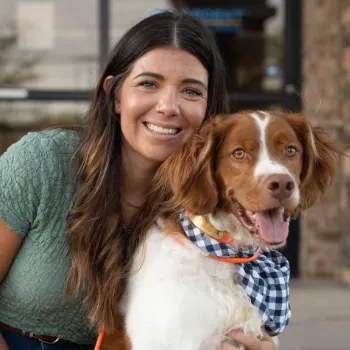Ongoing Clinical Trial
Autologous Cancer Vaccine with Checkpoint Inhibitor for Treatment of Canine Osteosarcoma
Study Purpose
This study is evaluating the safety and effectiveness of K9-ACV, a canine cancer vaccine made from a dog’s own tumor cells, combined with a novel checkpoint inhibitor (CD200AR-L). The study will compare this new approach to standard chemotherapy in dogs diagnosed with appendicular osteosarcoma (a type of bone cancer).
About the Study
This is a randomized clinical study. All dogs will undergo limb amputation as part of standard care. After surgery, dogs will be randomly assigned to one of two treatment groups:
K9-ACV Vaccine Group: Dogs receive an immune checkpoint inhibitor followed by three doses of the personalized vaccine, spaced three weeks apart.
Chemotherapy Group: Dogs receive standard carboplatin chemotherapy every three weeks for four total treatments. Dogs in both groups will return for follow-up visits at 4, 6, and 8 months for physical exams, lab work, and imaging.
Who Can Participate
Dogs may be eligible if they:
- Are at least 1 year old and weigh 20 kg or more
- Have confirmed Stage IIB appendicular osteosarcoma
- Are otherwise in good general health
Dogs may not be eligible if they:
- Have received immunotherapy, chemotherapy, or immune-modulating drugs within 30 days
- Are pregnant, lactating, or intended for breeding
- Are currently enrolled in another clinical study
Potential Benefits
- A chance to receive a novel immunotherapy
- Increased survival time
- Improved quality of life
Potential Risks
As with any medical treatment, side effects are possible.
Immunotherapy – local redness, swelling, or pain around the injection site; mild fever, lethargy; nausea, diarrhea, vomiting, reduced appetite; rare risk of severe allergic reaction that would require anti-inflammatory therapy.
Chemotherapy – bone marrow suppression (low white cell or platelet counts); gastrointestinal upset (nausea, vomiting, diarrhea); fever, lethargy. If untreated for bone marrow suppression, rarely dogs could become septic and require intensive antibiotic therapy.
Study Outcomes
Primary Outcome:
- Disease-Free Interval measured by chest x-rays at 8 months or upon disease progression
Secondary Outcomes:
- Quality of Life assessments using validated veterinary tools
- Monitoring of any side effects or adverse events
Additional Information
All dogs must pass a prescreening process that includes a physical exam, lab work, x-rays, and an ultrasound. Enrollment requires a commitment to follow-up visits for at least 8 months. The study team will work closely with you to monitor your dog’s health and provide updates throughout the study.
This clinical trial is designed in accordance with USDA CVB VSM 100.121
The ArdentOnco Team

Adrienne Wright, MBA, PHD
Site Leader VP, Science & Commercializaton

Dr. Tim Fan, DVM, PHD
Principal Investigator at University of Illinois

Dr. Brian Flesner DVM, MS, DACVIM (oncology)
Project Manager

Marissa Kroll
Study Monitor

Delaney Kennedy
Operations and Customer Support Manager
